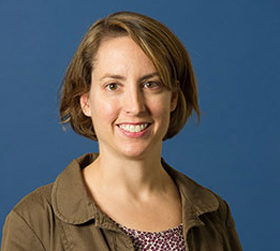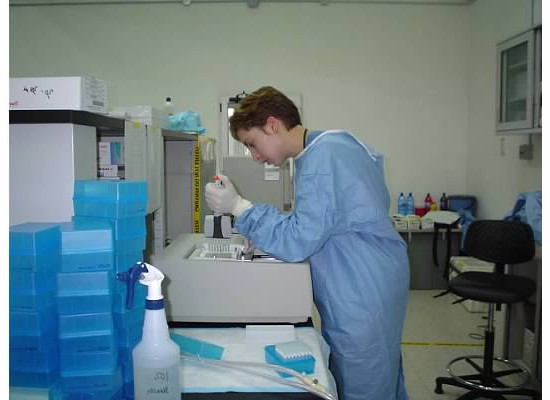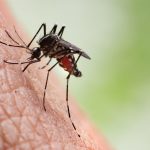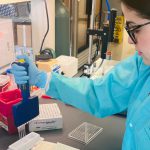University of Pittsburgh Center for Vaccine Research scientist Amy Hartman, Ph.D., has a pretty good idea what the 50 U.S. Centers for Disease Control and Prevention (CDC) employees sent to Africa for the latest Ebola outbreak are dealing with.
After all, she was in their shoes nearly a decade ago.
“There are all kinds of situations you can encounter – sometimes you are running tests in the middle of nowhere with no electricity,” said Dr. Hartman, assistant professor of infectious diseases and microbiology at Pitt’s Graduate School of Public Health. “And, at the very least, you’ll be wearing protective clothing that includes gowns, gloves, a respirator mask and face shield.”
Dr. Hartman was deployed to Angola, on the southwest coast of Africa, for a month in 2005 during the outbreak of Marburg, a close cousin of Ebola with similar symptoms and death rate. At the time she was a lab researcher at the CDC campus in Atlanta.
When serious infectious disease outbreaks occur, such as the current Ebola outbreak, the country where the outbreak is happening and the World Health Organization (WHO) can request that the CDC provide experts to help. The CDC is one of the very few organizations worldwide that can provide the level of testing and analysis needed to diagnose disease cases in such outbreaks. Until on-site testing is requested, samples will be shipped to the CDC headquarters in Atlanta for testing, which makes it take longer to get results.
The testing is necessary to determine whether a person has the infectious disease, and whether they need to be quarantined.
“The CDC will typically send teams of about five people for a month at a time,” Dr. Hartman said. “This outbreak, with 50 people recently deployed at once, is considerably larger.”
The CDC will also ship all of the laboratory equipment necessary to perform the testing and usually leaves it behind for a locally trained laboratory worker to continue testing.
During the Marburg outbreak that Dr. Hartman was deployed to assist with, they were mostly working with oral and nasal swabs and samples of breast milk. Local people were fearful of needles and did not want to provide blood samples due to a distrust of government officials and outsiders borne of a history of violence and unjust treatment.
That outbreak had an unusually high incidence of cases in infants because infected wet nurses were spreading the disease.
“We were working seven days a week – whenever a sample became available, we were working,” Dr. Hartman explained. “Any downtime we had was spent waiting around for more samples.”
Dr. Hartman cautions that the current outbreak is nothing that anyone outside West Africa needs to be panicking about.
“Even though this is the largest Ebola outbreak ever, there are other infectious diseases that cause millions of deaths per year, such as influenza, tuberculosis, dengue and malaria,” she said. “They just don’t have the urban legend status of Ebola.”
Dr. Hartman’s current research involves Rift Valley Fever, a disease of sub-Saharan Africa that is of particular interest to health and government officials because it can be spread by mosquitoes and aerosolized relatively easily, allowing a small sample of the virus or one sick person to infect a larger number of people.
“Unlike Ebola, which is actually relatively difficult to transmit in places with decent health care infrastructure, Rift Valley Fever is a disease that could begin spreading – or be made to spread – in developed countries due to presence of the mosquito vectors,” she said. “That’s why it’s important to develop vaccines and treatments now, which is what we’re working on at the Pitt Center for Vaccine Research.”
This type of research is able to be done safely at Pitt in the Regional Biocontainment Laboratory, a unique, high-security facility constructed with Pitt and National Institutes of Health funding. Dr. Hartman is the laboratory’s research manager.











